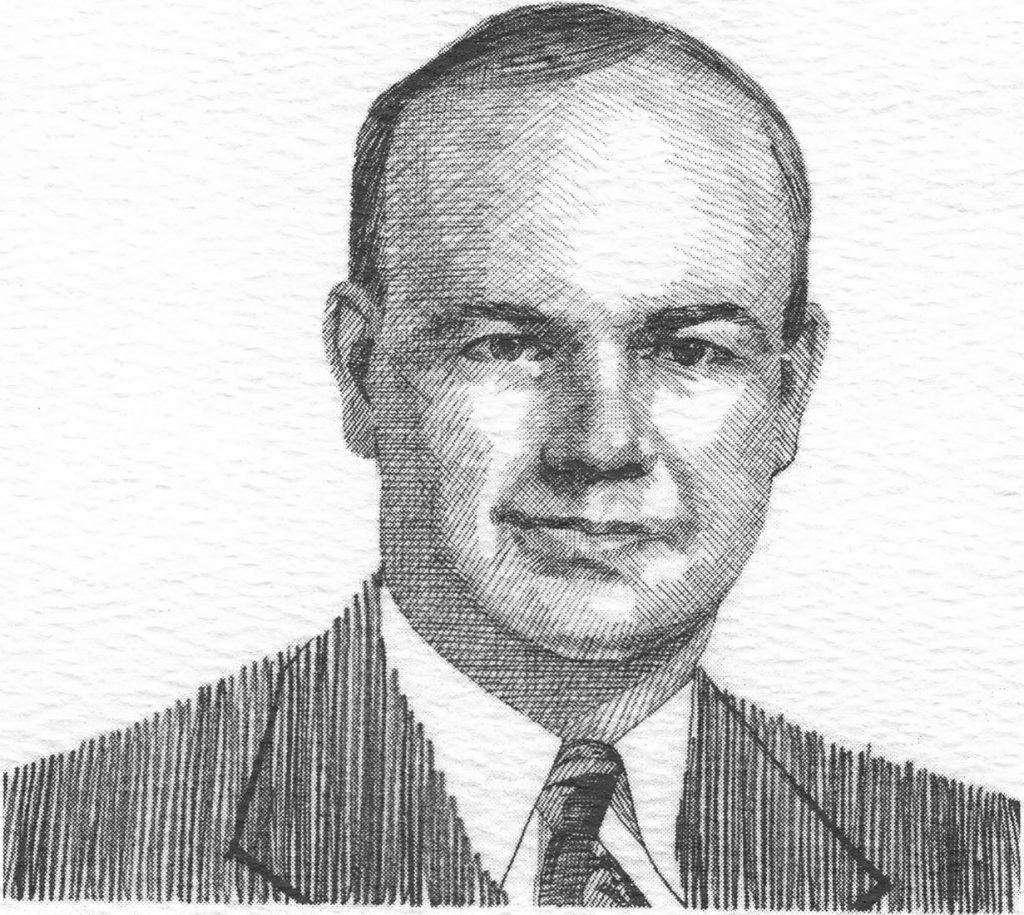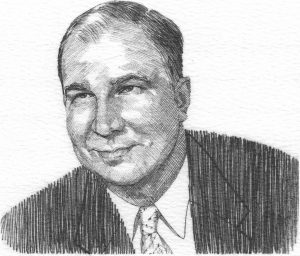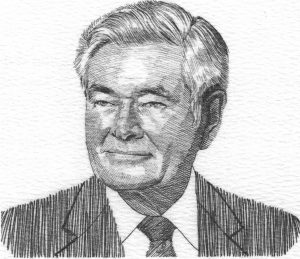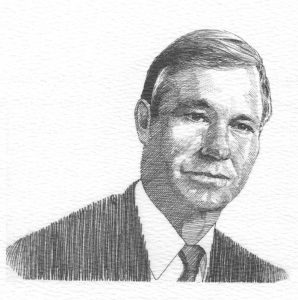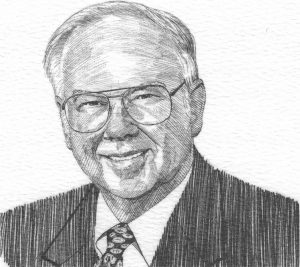The late Bernard A. Monaghan, former chief executive officer of Vulcan Materials Co., was a successful lawyer who left the legal profession to become a successful and innovative businessman as president and chief executive officer of Vulcan Materials Company until 1981.
Vulcan is the largest U.S. producer of construction aggregates, which it sells primarily to the private sector. The construction materials unit operates more than 220 aggregates plants, not including other production and distribution facilities, in the U.S. and Mexico.
Born in Birmingham to Bernard A. and Mary Frances Monaghan, he attended Birmingham-Southern College and earned a law degree from Harvard at 21, after which he traveled to Britain and earned a Rhodes Scholarship at Oxford.
After finishing at Oxford, he returned to Birmingham where he joined the law firm of what is now Bradley Arant Rose and White During World War II he rose to the rank of captain in the Marine Corps and received the Purple Heart and the Bronze Star medal. He remained active in the Marine Corps Reserve, rising to the rank of Lt. Colonel.
In 1948, he became a partner in the law firm and four years later took a leave of absence to serve as Department Counselor for the Department of the Army, for which he received the Exceptional Civilian Service Medal in 1953.
Almost 40 years earlier, the Ireland family had purchased a 75 percent interest in Birmingham Slag, a small Alabama company established in 1909 to process slag from a Birmingham steel plant. Third-generation Charles Ireland became president in 1951 and transformed Birmingham Slag from a regional operation into a national one. In 1956 it renamed itself Vulcan Materials and went public.
Monaghan had worked closely with Vulcan for many years as company counsel and consultant, so it was not a complete surprise when the company’s board of directors hired him as executive vice president in 1958. His hiring came at a time when the company was growing rapidly, expanding its facilities through acquisitions and mergers with production facilities in 12 states.
The firm was undergoing a period of reorganization and transformation from a family-owned business to a national corporation and at 42 years old, it was his responsibility to make sure the transition and reorganization worked.
As the slag supply decreased, the company began acquiring companies dealing in other aggregates, detinning, and chemicals. Monaghan realized the potential of chlorinated solvents, which are used in pharmaceuticals, chemical processing, aerosols, food extraction, paint stripping, dry cleaning and metal cleaning, and specialty adhesives. Detinning takes tin-plated steel scraps and separates the tin from the steel for re-sale.
Under Monaghan’s leadership, Vulcan’s diversification and expansion moved the company into the Forbes 500 ranking. Today Vulcan Materials Company is a leading provider of infrastructure materials required by the American economy. Vulcan Chemicals produces basic industrial chemicals, which include chlorine, caustic soda, hydrochloric acid, potassium chemicals, and chlorinated organics. Vulcan’s chemicals serve many industries and are used in a wide range of modern applications.
Monaghan was an active supporter of education, serving on the board of governors of Indian Springs School and as a trustee at Birmingham Southern College, where he was awarded a Doctor of Humanities degree. He also was a member of the Alabama Rhodes Scholarship Committee. The B.A. Monaghan’s Professorship in Business Administration at Birmingham Southern College is named in his honor.
He received the 1967 Gold Knight of Management Award from the National Management Association and in 1978 he was inducted into the Alabama Academy of Honor. In 2003, he was inducted into the Birmingham Business Hall of Fame.
He was a member of the board of directors of Beatrice Foods of Chicago, South Central Bell, Protective Life, SouthTrust Bank, Avondale Mills, and Southern Research Institute.
He also was a member of the Downtown Club, Mountain Brook Club, The Relay Club of Birmingham, and The Chicago Club.
A leader of cultural affairs in Birmingham, he was a member of Trustees for the Birmingham Civic Ballet, Birmingham Symphony Association, the Rushton Lectures of Birmingham, and a member of the Newcomen Society. He was given the 1972 Brotherhood Award from the National Conference of Christians and Jews.
His other civic interests included: participation as a member of the Executive Steering Committee of the Alabama Heart Hospital; Board of Directors of the Birmingham Committee of 100; Board of Directors of the Alabama State Chamber of Commerce; Director and member of the Executive Committee of the Birmingham Chamber of Commerce; member of the Board of Trustees of the Ireland Foundation of Birmingham; Chairman of the Jefferson County Survey Committee in 1950 to 1952; member of the National Executive Committee and Chairman of the Birmingham Executive Committee for the National Council on Crime and Delinquency; Board of Directors of the National Institute for Public Affairs, Washington, D.C., 1967 to 1973; Board of Directors for the Birmingham Urban League, 1968 to 1974.
Active in fund-raising for civic causes, Monaghan was chairman of the 1967 Ford Foundation Matching Grant Campaign for Birmingham-Southern College; agent for the Harvard Law School Fund from 1956 to 1960; on the Board of Directors for the Birmingham Community Chest, 1960, 1962 to 1966; Chairman, Special Gifts Campaign for the National Conference of Christians and Jews, Alabama Region in 1961 and 1963; Director and Chairman of the 1959 Christmas Seals Campaign for the Anti-Tuberculosis Association of Birmingham; chairman of the 1965 Foundation Committee of the Rotary Club of Birmingham; member of the Board of Directors of the Baptist Hospital Foundation; served the United Negro College Fund as the corporate chairman of the Birmingham Area 1977 Campaign; member of the Alabama Rhodes Scholarship Committee since 1949 and its Secretary in 1972; member of the Steering Committee for the Samford University’s 1970 Decisive Years Campaign.
He was married in 1941 to Margaret Rushton, with whom he had a daughter, Margaret Monaghan. He later was married to the former Mary Jackson Hughes.

